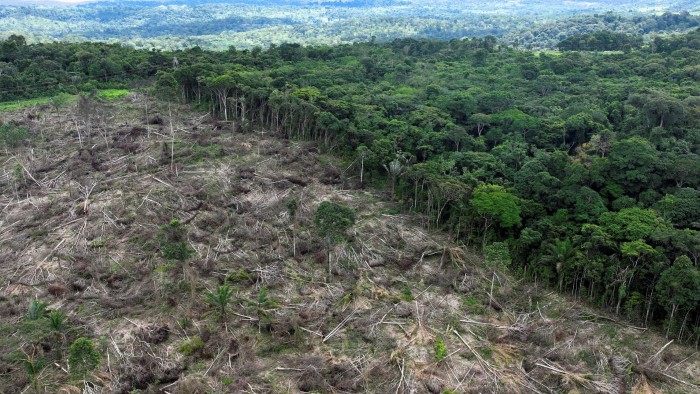Unlock the Editor’s Digest for free
Roula Khalaf, Editor of the FT, selects her favourite stories in this weekly newsletter.
EU lawmakers have voted to in effect exempt most member states from a contentious law banning commodities grown on deforested land from being sold within the bloc.
Brussels’ landmark deforestation law is set to force traders to provide documents showing that products ranging from rubber and cocoa to wood and cattle have not caused the destruction of forests.
While the law was intended to apply to commodities from within and outside the EU, environmental campaigners said a change made to the legislation on Thursday had created a “loophole” for member states.
“This is a blatant case of green protectionism, which will only inflame anger among producer countries outside the EU,” said Julia Christian of the forests NGO Fern.
Brazil’s agricultural lobby criticised the new clause, saying it made even clearer the law’s “discriminatory nature” against countries outside the EU.
“It will discriminate further against countries like Brazil, Indonesia and Malaysia that still have forests and are in a phase of agricultural expansion,” said Sueme Mori, international relations director at the Confederation of Agriculture and Livestock. “With the creation of this category, you are punishing these countries even more.”
The law, which was meant to come into force on December 30, has already complicated long-running negotiations for a free trade agreement between the EU and the Mercosur grouping of South American countries.
But widespread concern about a lack of readiness on the EU’s side to process the documentation needed prompted Brussels to propose delaying it for a year.
In a vote on Thursday to approve the delay, conservative lawmakers, backed by far-right parties including Germany’s AfD, also led a push to introduce a “no risk” category, whereby companies operating in countries where there was no deforestation would not need to apply the rules.
“Countries with no deforestation should be excluded instead of putting pressure on these countries with complex and bureaucratic requirements . . . We don’t want to punish those that have done their homework,” said Christine Schneider, a German lawmaker from the conservative European People’s Party, who led negotiations on the law.
As it stands, the law requires goods from all countries — regardless of their forest husbandry — to come with documentation proving that the item is not from deforested land. The new category would allow countries with stable or increasing forest size to be exempted from all checks.
However, Michael Rice, a lawyer at the NGO ClientEarth, said the proposal “makes no sense, risks undermining the entirety of the law” and should be rejected by member states when they negotiate with parliament over the final shape of the law in the coming weeks.
Christian, from Fern, said that the introduction of a “no risk” category was “particularly egregious” because it “would give EU forested countries a free pass” from dealing with the bureaucracy involved.
Liberal lawmakers have said that it also represents an effort from conservatives to protect farming interests in their countries.
Marie Toussaint, a Green MEP, said “Deleting due diligence requirements for products from so-called ‘no-risk’ countries opens up loopholes that invite further destruction of our precious forests.”
An EU diplomat said there should be “no modifications” beyond the one-year delay.
Companies have been split over the delay but many have voiced concern about late changes to the law, which they say will create more uncertainty and confusion over its implementation.
The ballot marked the first major test of the EU’s ambitious environmental laws following the election in June of a new European parliament with a much larger rightwing.
Ahead of the vote, commission officials were already concerned about exporter countries complaining to the World Trade Organization, according to two people familiar with their thinking.
“I’m expecting WTO cases,” said David Henig, a trade expert from the ECIPE think-tank. “Some folk have been flagging the WTO compatibility of the deforestation law for a while, particularly whether a zero risk category is based on reasonable criteria and isn’t just hidden discrimination.”
Schneider admitted that it was not yet clear whether creating a “no risk” category would go against WTO rules.
A commission spokesperson said that the commission would need to “analyse the results of the vote before taking a position”.
Additional reporting by Beatriz Langella in São Paulo
Read the full article here

